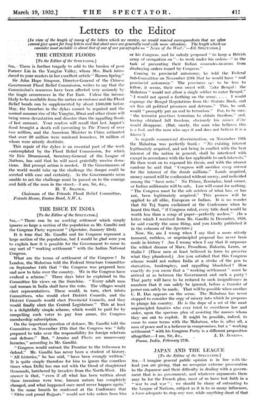THE ISSUE IN INDIA
[To the Editor of the SPECTATOR.] S111,—" There can be no working settlement which simply ignores so large a section of the population as Mr. Gandhi and the Congress. Party represent " (Spectator, January 23rd). It. is true that Mr. Gandhi and his Congress represent
large section of the population, but I would be glad were you to explain how it is possible for the Government to come to any sort of " working settlement " with the Indian National Congress.
What are the terms of settlement of the Congress ? In London, the Mahatma told the Federal Structure Committee on September 14th that " the Congress was prepared here and now to take over the country. We in the Congress have evolved a scheme." Three days later he explained to the 'Committee his views on the franchise. "Every adult man and woman in India shall have the vote. The villages would elect representatives. These would, in turn, elect taluka Committees, who would elect District Councils, and the District Councils would elect Provincial Councils, and they would finally elect the Central Legislature." This at least is a delightfully simple scheme, which would be paid for by compelling each voter to pay four mums, the Congress membership subscription.
On the important question of defence, Mr. Gandhi told the Committee on November 17th that the Congress was " fully . prepared to take over the responsibility for foreign relations and defence." But, " Armies and Fleets arc unnecessary luxuries," according to Mr. Gandhi.
" Cbngress would entrust the Frontier to the tribesmen to defend." Mr. Gandhi has never been a student of history. "All histories," he has said, " have been wrongly written." It is quite simple therefore for him to ignore the countless times when Delhi has run red with the blood of slaughtered thousands, butchered by invaders from the North-West. his answer is that, "even if all what has been written about these invasions were true, human nature has completely ohanged,.and what happened once need never happen again." In the same breath he confessed at the Conference that " Sikhs and proud llajpitts " would not take orders from him Or his Congress, nod lie calmly proposed " to keep a British army of occupation on "—to work under his orders—" in the task of preventing their Indian comrades-in-arms from disobeying orders issued by Congress."
Coming to provincial autonomy, lie told the Federal Sub-Conunittee on November 25th that he would have " real provincial autonomy." The provinces ii-1,, to be free to follow, it seems, their own sweet will. 'rake Bengal: the Mahatma " would not allow a single soldier to enter Bengal."
I would not spend a farthing on the army. . . I would expunge the Bengal Regulations from tIn. Statute Book, and set free all political prisoners and detenus." This, he said, would " promptly put an end to terrorism." For, to he sure, '• the terrorist pmetiscs terrorism to obtain freedom," and, having obtained full freedom, obviously his raison tIN-re would disappear. (But, surely, the man who believes this is a fool, and the man who says it and does not believe it is a knave !)
As regards conunercial discrimination, on November 10th the Mahatma was perfectly frank : " No existing interest legitimately acquired, and not being in coidlict with the best interest of the nation in general, shall be interfered with except in accordance with the law applicable to such interests." He then went on to expound his thesis, and with the utmost candour he said that " Congress will sacrifice every interest for the interest of the dumb millions." Lands acquired, money earned will be confiscated without mercy, and redivided among the " have nuts." No Prince, Zemiudar, land owner, or Indian millionaire will be safe. Law will count for nothing. " The Congress must be the sole arbiters of what has, or has not, been legitimately acquired." This process will be applied to all alike, European or Indian. It is no wonder that Sir Tej Sapru exclaimed at the Conference when lie heard this that, " if Congress ruled, every title deed would be worth less than a scrap of paper—perfectly useless." (In a letter which I received from Mr. Gandhi in December, 11128. lie said exactly the sane thing, and you kindly published it in the columns of the Spectator.)
Now, Sir, am I wrong when I say that a more utterly immoral, ruthless, or unprincipled proposal has never been made in history ? Am I wrong when I say that it surpasses the wildest dreams of Marx, l'roudhon, Bukarin, Lenin, or Stalin? (These men at least believed in force to preserve what they plundered.) Are you satisfied that this Congress scheme would not reduce India at a stroke of the pen to starvation, bankruptcy, and appalling bloodshed ? How exactly do you mean that a " working settlement " must be arrived at as between the Government and such a party ? That party will have. to be reduced to such imisignilksinee in aumbers that it can safely be ignored, before a transfer of power can safely be made. That will be possible when another C. R. Das appears on the scene. The Mahatma has never stopped to consider the orgy of misery into which he proposes to plunge his country. Ile is the dupe of a set of the most unprincipled fanatics who ever tried to overthrow law and order, upon the specious plea of assisting the masses whom they are out to exploit. It might be possible, indeed, to come to some terms with the Mahatma, who is, after all, a man of peace and is a believer in compromises, but a " working settlement" with his Congress Party is a different proposition altogether.—I am, Sir, &e., J. 1). JENKINS. Poona, India, February 27th.






































 Previous page
Previous page